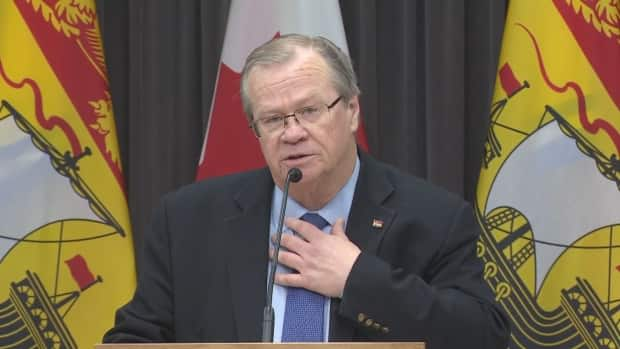COVID-19 task force struck after memo warning of 'excessive use' of masks took 2 weeks to send
The Higgs government's decision to centralize COVID-19 decision-making was taken after it took 23 health-care officials to agree to warn staff they could "rapidly exhaust" N95 masks and other personal protective equipment.
Last month, officials were alarmed that there was "excessive use" of masks for patients "who did not meet criteria for this level of PPE" in several hospital emergency departments, according to a memo obtained by CBC News.
The memo, dated March 31, tells all health-care facilities to return to existing infection control guidelines "effective immediately."
But according to Premier Blaine Higgs, it took two weeks for the memo to get the required signoff from 23 different health officials before it could be sent out.
The episode is the one cited by Higgs on Monday when he announced the creation of what the health minister called a military-style "command and control" task force to centralize and speed decision-making.
"Not long ago we signed off, through the Department of Health and through the different health structures and authorities around the province … on a personal protective equipment protocol," Higgs said.
"It took two weeks to sign off on 23 signatures. ... If we are going to fight a virus effectively and decisively, we can't be in a system where it takes 23 people to sign off each time that we make a decision," he said.
The premier's spokesperson Nicolle Carlin confirmed Tuesday that the March 31 memo is the one Higgs was talking about.
It is signed by 13 senior officials from the Horizon health authority and six from the Vitalité health authority.
The other signatures are from chief medical officer of health Dr. Jennifer Russell, provincial medical director Dr. Tushar Pishe, New Brunswick Medical Society president Dr. Chris Goodyear, and Medavie Health Services NB CEO Richard Losier.

On Monday Health Minister Ted Flemming said large organizations "by their nature" can't move quickly and called the existing decision-making process "top-heavy."
But he said that structure can't keep up with the "relentless surge" of COVID-19. "This virus does not respect the organizational charts of any organization," he said.
The new task force is made up of just four people and under New Brunswick's emergency declaration, it has the legal power to make decisions for regional health authorities, nursing and special care homes and ambulance and extramural services.
Asked Monday what prompted the creation of the task force, Higgs said the province's response was evolving "as time goes on" and as it learned best practices, including how to avoid "a lot of unnecessary discussion, a lot of unnecessary procedures."
Liberalizing use of PPE beyond our current guidelines will only serve to provide a false sense of security and rapidly exhaust a finite supply. - March 31 memo to all health-care facilities
In the March 31 memo, officials say it has "just come to our attention" that there was excessive use of the masks, and other contact-droplet precautions, for patients who didn't meet the criteria for that level of personal protective equipment (PPE).
It says the existing infection prevention and control guidelines at the two regional health authorities for managing COVID-19 patients complied with federal guidelines.
"Liberalizing use of PPE beyond our current guidelines will only serve to provide a false sense of security and rapidly exhaust a finite supply," the memo says.
It adds that N95 masks "do not provide superior protection" against COVID-19 except during medical procedures that trigger aerosol spray from patients.
The memo says the extra precautions shouldn't be used in hospitals for patients with no symptoms of respiratory infections, unless Public Health has directed those precautions for specific patients.
New guidelines
Dr. Gordon Dow, a task force member and infectious disease specialist with Horizon, said Monday the "top concern" for medical staff was whether there will be enough PPE in the coming weeks.
He said one role of the task force is to send a clear message to health-care workers about the supply of PPEs and "what is the best PPE to be used in various circumstances."
A new memo issued Monday endorsed by three unions representing health-care workers clarifies the use of PPEs by health-care workers.
The new guidelines say droplet-contact precautions, including the use of face shields or goggles, gowns, surgical masks and gloves, "must be used by health care workers for all interactions with suspected, presumed or confirmed COVID-19 patients."
N95 masks "must be used" in any room where aerosol-generating procedures "are being performed, are frequent or probable, or with any intubated patients," it says.
The new memo was agreed to by the province, the two health authorities, Medavie Health Services NB, as well as the New Brunswick Nurses Union, the Canadian Union of Public Employees and the New Brunswick Union.
A shipment of 295,000 U.S.-made N95 masks for New Brunswick was on hold in recent days after President Donald Trump tried to order manufacturer 3M to withhold exports to Canada and Latin America.
Late Monday there were reports that 3M had reached a deal with the Trump administration to allow exports to go ahead, but it wasn't immediately clear if that meant the masks bound for New Brunswick would reach the province soon.
Flemming said Monday the province has enough PPE for 12 to 14 weeks "in normal times" but in a pandemic "you go through them a little quicker, what is called the burn rate, and we need to balance that so we don't use them up."

